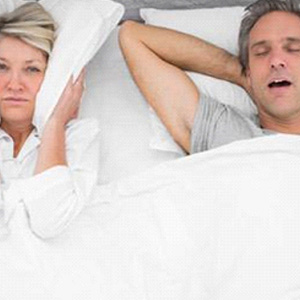Snoring is one of the most common sleep problems, and most people wouldn’t think it’s important to tell their dentist that they snore. A snore on its own is relatively harmless, but it can also be a sign of something more serious, like sleep apnea.
What’s in a Snore?
A snore is the sound of the soft tissue vibrating against the nasal and oral passages. This blockage or partial blockage to the free flow of air can interrupt the sleep cycle. Snoring is a common sleep problem, and up to 45% of adults snore periodically. Twenty-five percent are reported to be frequent snorers. Some common factors found in habitual snorers is obesity, poor muscle tone in the tongue and throat, bulky throat tissue due to weight, and allergies.
The Sleep Apnea Connection
Snoring is also a common symptom of obstructive sleep apnea. OSA is a breathing disorder characterized by brief interruptions of breathing during sleep due to a blockage in the airway. Similar to snoring, obstructions occur when throat muscles, the tongue, tonsils, or the soft palate relax and cover the airway, preventing breathing. In some cases, you may not realize you snore or stop breathing. Sometimes a partner or spouse can tell you if you exhibit some of these symptoms while you are asleep. Other common symptoms of obstructive sleep apnea are daytime fatigue, insomnia, awakening with a gasp or startling yourself awake, waking with dry mouth, a sore throat or a headache. You can take our sleep survey to see if you have other symptom of sleep apnea. OSA is typically diagnosed using a polysomnogram or a sleep study.
Airway Screening
Many dentists now perform an airway screening as part of your routine dental exam. During this exam, your dentist asks specific questions about your sleep habits including if you snore, do you wake up tired or with a sore throat or a headache and might check for signs of irritation in your mouth and throat. If your dentist feels there is enough evidence, he or she may refer you to a sleep specialist for a polysomnogram, or sleep study, to rule out sleep apnea.
Treatment
The course of treatment depends on the cause of your snoring. If a sleep study reveals you have sleep apnea, you may be prescribed a CPAP, APAP, or BiPAP machine to help force air through your nose or mouth. If you can’t tolerate sleeping with one of these machines, you might be a good candidate to wear an oral appliance made by your dentist that fits over the bottom teeth. This device positions your jaw or tongue forward and helps prop open the airway preventing the collapse of soft tissue. Some of the most straightforward treatments for snoring regardless of its cause include losing excess weight, avoiding alcohol before bed, quitting smoking, and sleeping on your side. There may be no permanent cure for sleep apnea or snoring, but there are many treatment options available. A consultation with your dentist or doctor is a great way to get on the road to better sleep. Contact us to learn how we can help you stop snoring and sleep better!

